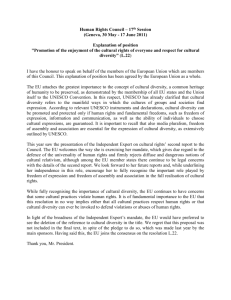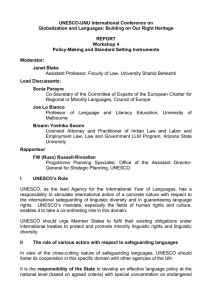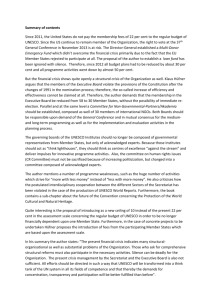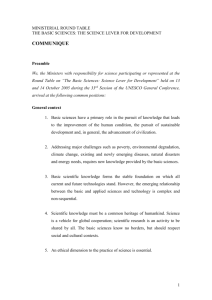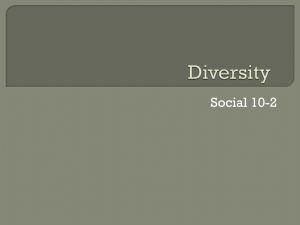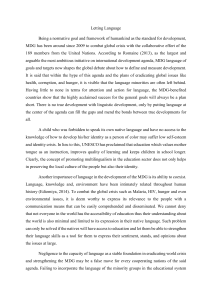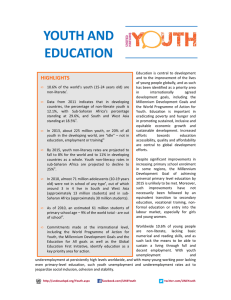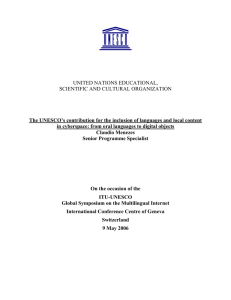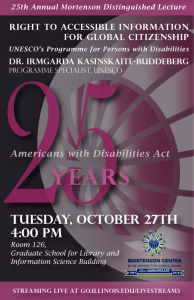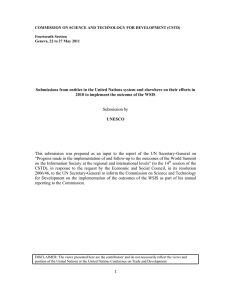Workshop Report Multilingualism, translation, communication and literacy •
advertisement
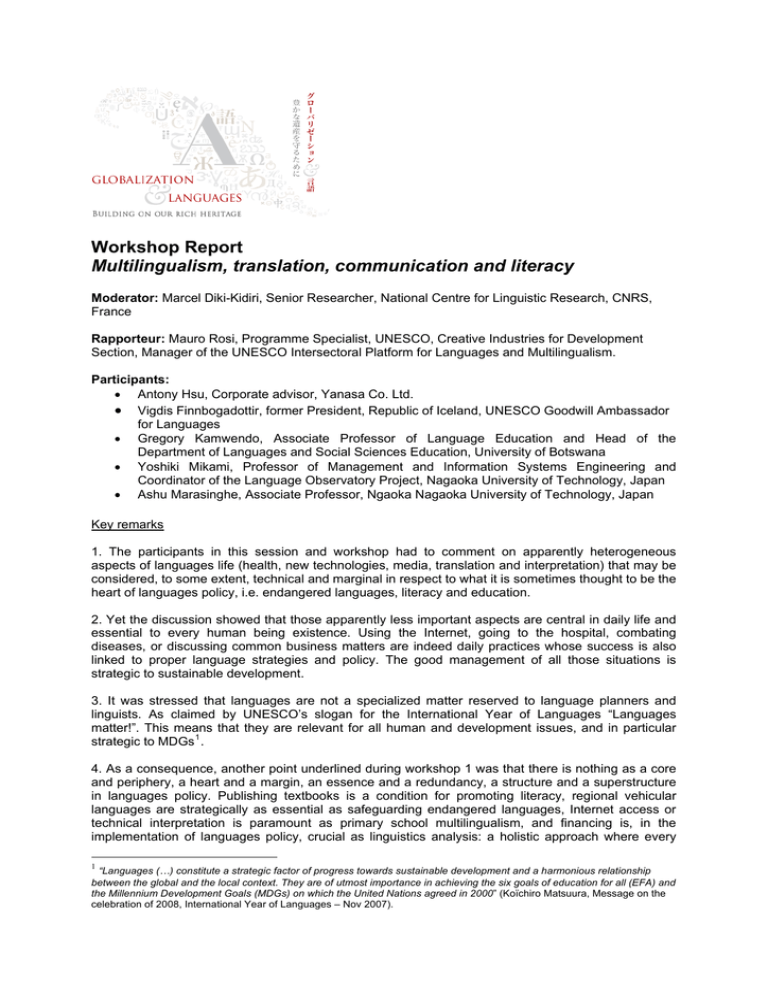
Workshop Report Multilingualism, translation, communication and literacy Moderator: Marcel Diki-Kidiri, Senior Researcher, National Centre for Linguistic Research, CNRS, France Rapporteur: Mauro Rosi, Programme Specialist, UNESCO, Creative Industries for Development Section, Manager of the UNESCO Intersectoral Platform for Languages and Multilingualism. Participants: • Antony Hsu, Corporate advisor, Yanasa Co. Ltd. • Vigdis Finnbogadottir, former President, Republic of Iceland, UNESCO Goodwill Ambassador for Languages • Gregory Kamwendo, Associate Professor of Language Education and Head of the Department of Languages and Social Sciences Education, University of Botswana • Yoshiki Mikami, Professor of Management and Information Systems Engineering and Coordinator of the Language Observatory Project, Nagaoka University of Technology, Japan • Ashu Marasinghe, Associate Professor, Ngaoka Nagaoka University of Technology, Japan Key remarks 1. The participants in this session and workshop had to comment on apparently heterogeneous aspects of languages life (health, new technologies, media, translation and interpretation) that may be considered, to some extent, technical and marginal in respect to what it is sometimes thought to be the heart of languages policy, i.e. endangered languages, literacy and education. 2. Yet the discussion showed that those apparently less important aspects are central in daily life and essential to every human being existence. Using the Internet, going to the hospital, combating diseases, or discussing common business matters are indeed daily practices whose success is also linked to proper language strategies and policy. The good management of all those situations is strategic to sustainable development. 3. It was stressed that languages are not a specialized matter reserved to language planners and linguists. As claimed by UNESCO’s slogan for the International Year of Languages “Languages matter!”. This means that they are relevant for all human and development issues, and in particular 1 strategic to MDGs . 4. As a consequence, another point underlined during workshop 1 was that there is nothing as a core and periphery, a heart and a margin, an essence and a redundancy, a structure and a superstructure in languages policy. Publishing textbooks is a condition for promoting literacy, regional vehicular languages are strategically as essential as safeguarding endangered languages, Internet access or technical interpretation is paramount as primary school multilingualism, and financing is, in the implementation of languages policy, crucial as linguistics analysis: a holistic approach where every 1 “Languages (…) constitute a strategic factor of progress towards sustainable development and a harmonious relationship between the global and the local context. They are of utmost importance in achieving the six goals of education for all (EFA) and the Millennium Development Goals (MDGs) on which the United Nations agreed in 2000” (Koïchiro Matsuura, Message on the celebration of 2008, International Year of Languages – Nov 2007). single part is as important as the whole is necessary. Given the importance of investments required, it was said that the mapping of possible financing sources and mechanisms is an ultimate priority. 5. Given the multiplicity of fields and levels concerned, effective languages policy cannot but be multistakeholders based. Different ministers (from education to culture, from trade to professional training), different civil society groups (from languages associations to readers clubs) and a variety of professionals in public and private bodies (teachers, literacy experts and planners, publishers, lawyers, interpreters, technical and scientific translators) are or must be on board in this process. 6. It was also stressed that a multilingual society is not necessarily a context where everybody speaks all useful languages, but a place where communication is effective beyond languages barriers thanks to a variety of means and resources, including human and technical interpretation and translation resources. Recommendations 1. Every language policy should follow a holistic approach, take into account all possible aspects of social interaction, including technical and practical ones and aim to impact on all social interaction places (school, administration, parliament, justice, market, enterprises, financing bodies hospitals, media, cyberspace and software engineering, sport and entertainment, charity, cultural institutions, publishing, television cinema, advertisement etc). 2. UNESCO, regional governmental bodies (like ACALAN 2 , Maaya 3 , Council of Europe, and European Commission) and national governments are invited to organize or further develop democratic forums, consultation initiatives and frameworks that facilitate transversal participation of public opinion, research actors, public institutions, private partners, civil society, market actors and professionals. 3. Special initiatives should be taken in favour of interpreters and translators associations at national level (by governments), regional level (by institutions like ACALAN, Maaya, Council of Europe, European Commission) or globally (UNESCO). 4. Language policy monitoring tools (observatories, reports and statistics), should be created or further supported and developed at national, regional and global level, also focusing on linguistic aspects of 4 pertinent existing UNESCO and UN standard-setting instruments . 5. Languages safeguarding should be accompanied by modernization, namely through terminology development. 6. As a priority for international institutions and UNESCO, possible sources able to finance should be mapped and publicized. 7. Language learning and teaching, at whatever level, both in public and private schools, should be also encouraged as a resource and a means to better understand the world through communication and engagement. 2 3 African Academy of Languages World Network for Linguistic Diversity 4 Main standard setting tools: UNESCO Universal Declaration on Cultural Diversity and its Action Plan (2001) Convention for the Safeguarding of the Intangible Cultural Heritage (2003) Recommendation concerning the Promotion and Use of Mutilingualism and Universal Access to Cyberspace (2003) Convention on the Protection and Promotion of the Diversity of Cultural Expressions (2005) UN International Covenant on Civil and Political Rights (1966), UN Declaration on the Rights of Persons Belonging to National or Ethnic, Religious and Linguistic Minorities (1992) UN Declaration on the Rights of Indigenous Peoples (2007).
